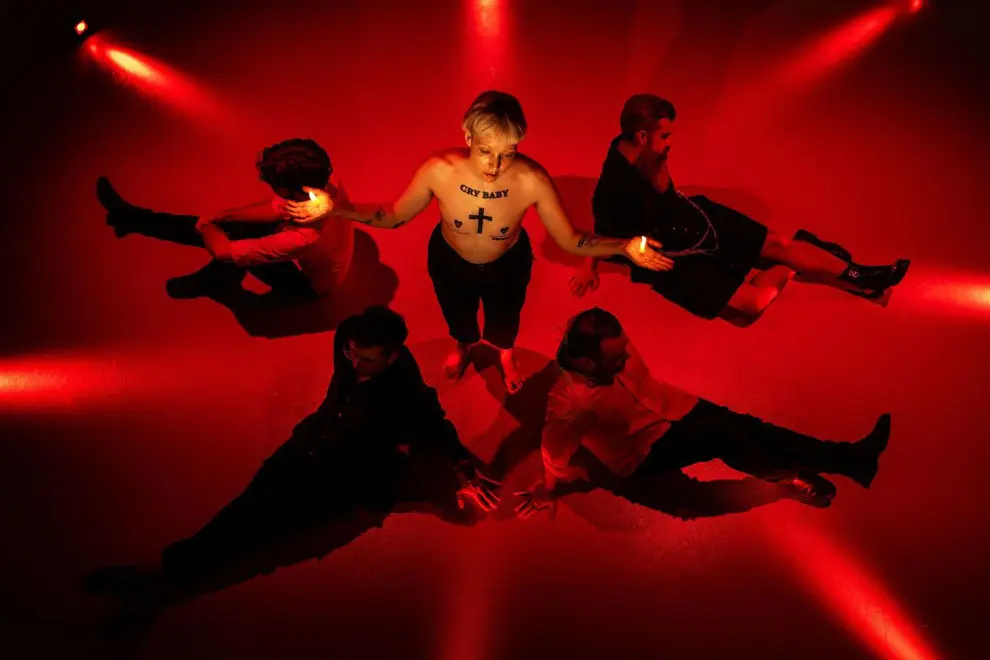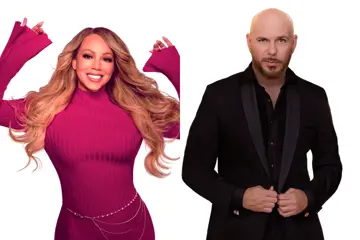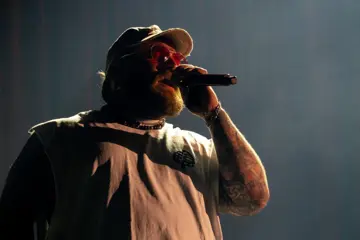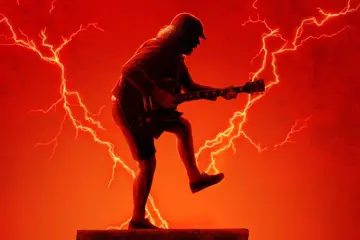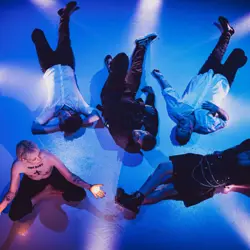 Alter Boy
Alter BoyPerth (Boorloo) based indie electro group Alter Boy’s debut album I Don’t Live Here Anymore has been percolating in the world since its release in early September, drawing mass praise for its immersive sound and raw storytelling.
To celebrate the album’s release, Alter Boy are taking off on a national tour, kicking off in Melbourne (Naarm) on Friday 4 October.
Ahead of opening night, the band’s beating heart, lead singer, lyricist, and auteur Molly Priest reflected on the album, breaking down the story behind each track. Check out her explanations of the album below.
I Don’t Live Here Anymore with Molly Priest
Eclipse is the reflection of a former Echoist. In the poet Ovid’s Metamorphoses, Echo is the character who has no personal identity and who merely echoes the words of Narcissus.
The song also references the singer’s younger years and her cult membership, which reflects a life lived in service to higher-order beings. The cult operated under the belief that those who acted in selflessness would be recovered from Earth by beneficent extraterrestrials. I was abducted each night in my death, they didn’t keep me they let me descend.
Portrait of God is about the Law of One, which suggests that all existence is contained within a single universal consciousness. The Law of One is found within theories of quantum physics, psychology as well as many ancient spiritual teachings. A shared notion that we are all connected, not only to each other but to all of nature and to all matter in the universe.
The experience or perception of the Law of One has been reported by those who meditate, use psychedelic substances, and in the collective effervescence of a concert. A god fracturing to experience itself and keep itself company.
Portrait of God speaks directly to the listener, finding perfection in the most despairing moment. It acknowledges the complex human condition contained within the collective and the individual.
The carnation and the gun.
The song encourages radical self-love. There is no perfect human and no imperfect God.
You’re alone in a room. It’s a picture of you; it’s a portrait of god.
I wanted to talk to the listener directly. We’re all striving for something, some future time or circumstance that will make us okay, acceptable, or true. It’s you right now. You have to welcome all of it—the stuff within you that you’re ashamed of or scared of, the uncertainty of it all. All of it together is the complete experience, and it’s happening inside of you.
Prepare The Moon is a love song dedicated to myself from the imagined perspective of a selfish ex-lover.
Oh, you live to please, get on your knees, I call you, come to me.
I spent many years writing love songs and preparing gifts and accolades for entitled and arrogant men, so I wanted to write a love song for the self I was at that time. To recall myself from the perspective of the person receiving me, naïve and pining, fresh off god and searching for a surrogate.
I think the person who is infatuated and desperate to please is degraded for building that kind of attachment, but this song is like “hey, you thought you were entitled to it, hon this is embarrassing for you.”
If I Don’t See You is about reincarnation and lessons learned. While the song proposes to meet again in a cycle of death and rebirth it also doubts itself intermittently, even suggesting that it knows nothing of itself, and that the story it is telling is no more real or true than its narrator.
You’re A Killer I’m Alive is an unsent letter to a parent from a child raised in disorder and delusion. It accuses the parent of colonising the mind and distorting reality in an attempted murder of the authentic self.
Singing, which began as an extension of the parent and a skill developed in survival, is now used to speak up for the child and hold the parent accountable.
These parents don’t curate a person directly; they shape the behaviour of a child by approaching and withdrawing, encouraging and degrading. They poison a child with fear, guilt and shame, and they confuse the child by presenting a false self in public.
From an early age you learn to read them and monitor their emotions and body language and you learn to do your best impression of an object to keep yourself safe. You have to feel everything they refuse to feel or don’t know how to feel, and there’s no way to meet or discover yourself in that place.
You come out of it as a walking, talking survival response and an echo of the people around you. Your true needs and inclinations are buried very deep and it’s an archaeological mission to find yourself at the end of it. And part of the recovery is to sever the attachment to the definition of yourself as bad or wrong, and the parent as good and true.
And it’s painful because there’s so much love and a deep sympathy for these people who were never capable of loving or caring about you. Singing has been a significant part of my false self, and I’ve felt that dissonance for a long time.
The sense that I wasn’t meant for this. I’ve also watched my experience with Alter Boy transform because the storytelling is honest. I think I was supposed to tell stories in any way I can, and that’s what makes it mine.
We’ve Been Waiting is about ego death or the death of the subjective self. The song invites listeners into the process of dismantling the character of the self adopted to survive the world and the slow march toward the self hidden beneath, with the desire to meet in this place. The song is also about a psychedelic trip, from which the author had the experience of being ‘God’ through the lens of a helpless child.
Don’t Hurt Me (I Used To Be A Baby) seeks nothing but to sit for a moment in profound despair with the recognition of what it means to be alive in the present era.
The closing coda of this dark pop track is reminiscent of the final orchestral number of a sinking ship, accompanied by a willingness to let it go under. The single points at the collective existential dread of a generation waking to the dystopian experience.
This message is overlayed by broader anxieties of the human condition and the meaning of life. The song deals with themes of shame and guilt, fear and helplessness, and the distorted dichotomy of good and evil.
Mercy proposes the character of a person as a product of the world into which each of us born. Nobody is anybody’s fault and each of us are deserving of compassion. The song reflects upon the false dichotomy of good and evil, victim and perpetrator, making a plea for grace at the end of life. The song references the Wicked Witch of the East, an insight into the way the author feels about herself when recalling the past.
Lights On In Wonderland is about shedding an old and painful life and upon entering a new and beautiful one. The song’s title is a nod to DBC Pierre’s novel Lights Out In Wonderland, which tells the tale of a man committed to the pursuit of pleasure as a last hurrah before self-destruction. In the end the death is a symbolic kind, the release of moral perfectionism, or surrender to moral defectiveness.
Fin. is the final track on the album and an attempt at building connection in the void. The track confronts four existential fears of death, meaningless isolation, and free will. As the song develops, it attempts to reach deeper into the primordial self with an invitation to enter and connect in the void. The song is then broken down into its core elements, descending into a frequency that resonates in the body before dissolving into its final seconds, which exist solely in the consciousness of the listener.
I Don’t Live Here Anymore is out now. Alter Boy are touring Australia in October - tickets can be found here. The full tour dates are as follows:
Friday 4 October - Stay Gold, Melbourne (Naarm)
Saturday 5 October - Lansdowne Hotel, Sydney (Warrane)
Sunday 6 October - The Outpost Bar, Brisbane (Meanjin)
Friday 11 October - Freo.Social, Fremantle (Walyalup)
Saturday 12 October - The River (Wooditup)
This piece of content has been assisted by the Australian Government through Music Australia and Creative Australia, its arts funding and advisory body


